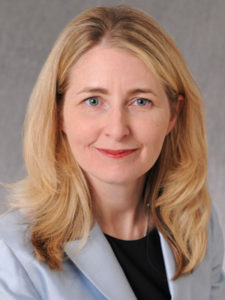The largest gathering of rheumatology professionals in the world takes place at the ACR/ARHP Annual Meeting, October 19-24 in Chicago. If you haven’t registered to join the almost 16,000 rheumatologists, allied health professionals, trainees, exhibitors, and others from more than 100 countries coming together to learn about and discuss the latest scientific and clinical developments, there’s still time to register.

“The number of people attending and the diversity of the rheumatologists and other attendees really puts this meeting in a unique place,” said Victoria Shanmugam, MBBS, MRCP, chair of the Annual Meeting Planning Committee.
Dr. Shanmugam talked about several of the highlights among the more than 450 educational sessions, hands-on workshops, review courses, and lectures from experts around the world that offer the chance to earn over 50 hours of CME credit. Some answers have been edited for length and clarity.
What excites you most about this year’s meeting?
The Opening Lecture (4:30 pm Saturday), which will feature Hollywood film producer Jonathan Koch, who survived macrophage activation syndrome and hemophagocytic lymphohistiocytosis. It ultimately resulted in the amputation of his hands and feet and an eventual hand transplant. His story is really a remarkable journey of survival and resilience, and I think it will be a valuable experience for everyone that attends. Jonathan’s resilience through this illness, and his ability to turn a situation that was quite bleak at times into this incredibly inspiring story and experience, is special.
As an organization, we’re quite excited to involve patients more in the Annual Meeting. Patients will have opportunities to present at poster sessions, and a number of concurrent sessions will offer a patient perspective alongside a physician’s perspective or nurse practitioner’s perspective. That will help our rheumatology community be even more responsive to the needs of the patient.
What else is new this year?
The plenaries are going to be highlighting the top-scoring abstracts. There will be some very exciting research presented, and what has been selected for presentation is the cutting-edge science in our field. We’re also building on previous successes in partnering with other international rheumatology groups. Our sessions with EULAR, AFLAR, APLAR, and PANLAR, for example, give us an important worldwide view.
How did you and the other organizers develop the programming for this year’s meeting?
We try to be responsive to all of our attendees. This year has been focused on trying to build strong rheumatology communities with our patient partners and with rheumatologists around the globe. We want our attendees learning from the full breadth of our practices worldwide. One of the unique opportunities about this meeting is that our attendees get to interact and engage with some of the thought leaders of rheumatology, and can learn from the brightest minds in the field about the latest rheumatology research discoveries.
How significant is ARHP’s contribution to the Annual Meeting, and to the field in general?
ARHP sessions engage the audience across all levels of the organization. A number of sessions this year focus on providing training and education on various aspects of both rheumatology and research methodology. One of the innovations that we’ve developed is several joint ACR/ARHP sessions that really cross the boundaries between academicians, physicians, and allied health professionals with a focus more on patient-oriented issues, including one that is on my wish list to attend—it is entitled “My Chromosomes & Me: Talk to Patients About Consumer Genetic Tests.” This session will focus on educating clinicians about how to talk to patients regarding direct-to-consumer genetic testing, and what to do when your patient walks into your clinic room with a printout from one of those services. I’m excited to go to that session.
What other sessions have your attention heading into the Annual Meeting?
I think the Updated Classification Criteria for Large-Vessel Vasculitis (4:30 pm Tuesday, Oct. 23) is going to be very interesting and well attended.
There also is a great session that’s been put together looking at novel and emerging treatments for osteoarthritis (12:30 pm Tuesday, Oct. 23).
One of the state-of-the-art sessions will tackle treating lupus in 2018, which I think will provide some good updates for this challenging disease (1:00 pm Monday, Oct. 22).
On a personal level, I’m also very much looking forward to the Hench Memorial Lecture (2:30 pm Tuesday, Oct. 23). Developed to honor renowned rheumatologist Dr. Phillip Hench, this year the lecture will feature Dr. Eric Matteson presenting on the history and future of glucocorticoids.
Finally, this year’s Great Debate (2:30 pm Sunday, Oct. 21) features a discussion on the hydroxychloroquine dosing recommendations, which I think have been moderately controversial among rheumatologists. We should have an ophthalmology point of view and a rheumatology point of view, and the session will be entertaining and educational.
What other advice do you have for attendees?
Download the Annual Meeting App. It allows attendees to set sessions to attend and also search all of the abstracts that will be presented during the meeting. It’s evolved so much over the years—now I can’t leave home without it!
ACR Beyond continues to improve, also. It’s a great way for people to extend the education by viewing recordings of sessions that they missed or want to review again.
